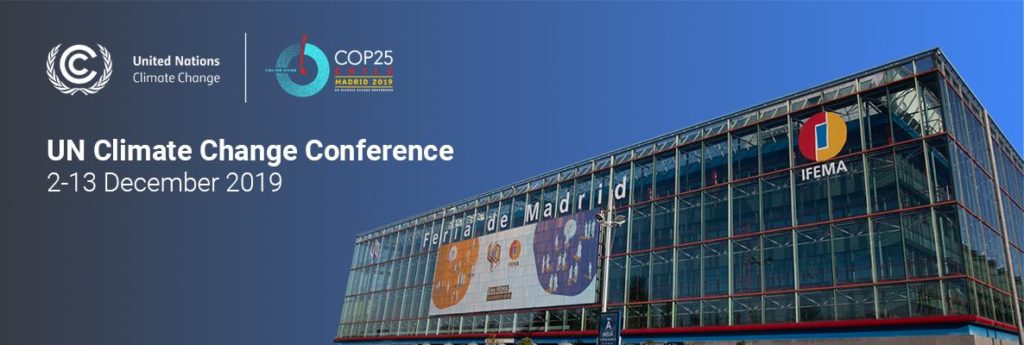
COP25 – Climate Smart? 気候泥棒 or 気候賢い?
2019.12.02
(English blog last)
COP25 (気候に関する国際会議)がスペイン(マドリード)で始まります。12月2日から13日の間、世界の団体、企業、政府が集まります。
私たちの目標は、2030年までにCO2を少なくとも50%削減することです。しないと大惨事になる可能性が高いと言われています。
気候変動から気候危機へ。

中国、インド、日本は世界で1位、3位、5位のCO2排出源です(2017年)。今日、スウェーデンの新聞はアジアを「気候の泥棒」と呼びました。
「Climate Thief」(気候泥棒) と「Climate Smart」(気候賢い) は、環境先進国スウェーデンでよく使われる言葉です。
あなたは気候泥棒になりますか?それとも、気候賢いになりますか?
■アジア – おそらく気候変動によって最も被害を受けている大陸です。洪水、嵐、熱波…
■ アメリカ – 今回は何も言わないでおきましょう…
■ ブラジル – アマゾンの森林伐採で、人や有名ブランドからボイコットされています。森林は気温上昇を抑えます。250本の木は5トンのCO2を吸収します。これは世界の1人当たりの平均排出量と同じです。*)
■アフリカ – CO2削減や省エネによって、発展や新しい仕事の創出と制限されるのではないかと心配しています。
■ ヨーロッパ – Brexitや右翼政治への懸念の一方で、CO2を削減するための最も厳しい目標と規制も進んでいます。CO2ゼロ (カーボンニュートラル) な再生可能エネルギーが増加しています。
希望
世界では、すでに1,100万人がCO2ゼロの再生可能エネルギー部門で働いています。アフリカ諸国の多くは、ほとんどの西側諸国よりも1人あたりのCO2排出が1/10未満です *)。今後、発展しつつ、そのレベルを維持することができれば、アフリカは大きな希望になります!

Klimatsmart – スウェーデン語の「気候賢い」!気候賢い住まい、気候賢いクリスマス、気候賢い食事、気候賢い乗り物…
スウェーデンは経済が成長しながら、一人当たりの平均CO2は日本の半分。スウェーデンの首都ストックホルムはすでにCO2を50%削減しています **)。
可能です。CO2の削減と発展。デカップリングと呼ばれています。
これで、3つのキーワードができました。気候泥棒、気候賢い、デカップリング。
気候賢い
CO2の削減はそれほど難しくありません。地下の資源を使うと、問題が発生します。還すことができる以上に取らない。地上の資源を使えば、中立なCO2しか出ません。
システム全体を地上の資源を利用する社会に変えることです。
シンプル。
私の母国スウェーデンでは、CO2ゼロ(中立なCO2)の食品廃棄物で走る車やバスは、もう珍しくありません。人の体温を暖房に利用する建物、風力で走る列車、食品廃棄物、人間、風…すべて地上!
可能です。
私は自宅でも実践しています。
自宅でのCO2を約90%削減し、オフィスではCO2ゼロの電力を100%導入し、売り上げ当たりのCO2排出量を約50%削減しました(事業に関連する飛行や輸送を含む)。
可能です。CO2の削減。
COP25開催に合わせ、これからいくつかのヒントを紹介していきます。
*) World Bank 2014 / 世界銀行 **) ストックホルム市、1990年から
ENGLISH
Climate Thief or Climate Smart?
COP25 – the Climate Conference – starts today in Spain (Madrid). Between December 2 and 13 people, companies, Governments will meet to stop a climate crisis.
Our Goal is to reduce CO2 by at least 50% by 2030.
We need to go from being Climate Thieves to becoming Climate Smart!

China, India, Japan are the No 1, No 3 and No 5 CO2-emitters in the World (2017). Today, a Swedish newspaper called Asia “Climate Thieves”.
“Climate Thief” and “Climate Smart” are two words commonly used in Sweden, one of the leading nations in international meetings.
So, will you be a Climate Thief?
Or will you be Climate Smart?
- Asia – is probably the continent worst hit by climate change. Floods, storms, heatwaves…
- USA – well let’s not even mention them this time.
- Brazil – is boycotted by organizations and famous brands because of Amazon deforestation. Forests keep our climate cool. 250 trees absorbs the average global citizens’ annual CO2 emissions (5 ton * )
- Africa – is worried that CO2 cuts and energy savings will limit them from developing or create new jobs.
- Europe – struggles with Brexit and right wing politics. At the same time as having some of the most progressive regulations for reducing CO2.
HOPE
11 million people already work in the CO2-neutral renewable energy sector. Many African countries emit less than 1/10 CO2 per person than most western countries *). Keeping that level while also keep developing, could make Africa the great hope!
Swedens average per person CO2 is just half of that of Japans. The capital Stockholm has already cut CO2 by 50% **). At the same time Swedens economy keeps growing.
It is possible. CO2 reduction and development. It’s called “decoupling”.
So now we have 3 key words. Climate Thief – Climate Smart – Decoupling.

Klimatsmart – “Climate smart” in Swedish. Climate smart food, climate smart christmas, climate smart transportation…
CLIMATE SMART
Reducing CO2 is not that difficult. Take resources from BELOW ground and you’ll run into trouble. Take resources from ABOVE ground – while not taking more from nature than giving back – and you’ll emit only neutral CO2 (“zero” CO2).
It’s all about changing our system to above-ground societies.
In my home country Sweden, cars and buses running on CO2-neutral FOODWASTE is so common people don’t even think it’s unusual anymore…Buildings heated by HUMANS, Trains run by WINDPOWER.
Foodwaste x Humans x Wind…all above ground resources,
It is possible.
And yes, I have tried it myself.
Going from “below ground to above ground” we reduced CO2 by nearly 90% in our home. At our offices we introduced 100% CO2-neutral electricity. And we halved CO2 from transport (like flying and delivery) in relation to our company’s growth.
It is possible.
And I will share some of the tips here during the COP25.
*) World Bank 2014. **) Stockholm City/1990- /Territorial CO2.
COP25 – Climate Smart? 気候泥棒 or 気候賢い?
2019.12.02
(English blog last)
COP25 (気候に関する国際会議)がスペイン(マドリード)で始まります。12月2日から13日の間、世界の団体、企業、政府が集まります。
私たちの目標は、2030年までにCO2を少なくとも50%削減することです。しないと大惨事になる可能性が高いと言われています。
気候変動から気候危機へ。

中国、インド、日本は世界で1位、3位、5位のCO2排出源です(2017年)。今日、スウェーデンの新聞はアジアを「気候の泥棒」と呼びました。
「Climate Thief」(気候泥棒) と「Climate Smart」(気候賢い) は、環境先進国スウェーデンでよく使われる言葉です。
あなたは気候泥棒になりますか?それとも、気候賢いになりますか?
■アジア – おそらく気候変動によって最も被害を受けている大陸です。洪水、嵐、熱波…
■ アメリカ – 今回は何も言わないでおきましょう…
■ ブラジル – アマゾンの森林伐採で、人や有名ブランドからボイコットされています。森林は気温上昇を抑えます。250本の木は5トンのCO2を吸収します。これは世界の1人当たりの平均排出量と同じです。*)
■アフリカ – CO2削減や省エネによって、発展や新しい仕事の創出と制限されるのではないかと心配しています。
■ ヨーロッパ – Brexitや右翼政治への懸念の一方で、CO2を削減するための最も厳しい目標と規制も進んでいます。CO2ゼロ (カーボンニュートラル) な再生可能エネルギーが増加しています。
希望
世界では、すでに1,100万人がCO2ゼロの再生可能エネルギー部門で働いています。アフリカ諸国の多くは、ほとんどの西側諸国よりも1人あたりのCO2排出が1/10未満です *)。今後、発展しつつ、そのレベルを維持することができれば、アフリカは大きな希望になります!

Klimatsmart – スウェーデン語の「気候賢い」!気候賢い住まい、気候賢いクリスマス、気候賢い食事、気候賢い乗り物…
スウェーデンは経済が成長しながら、一人当たりの平均CO2は日本の半分。スウェーデンの首都ストックホルムはすでにCO2を50%削減しています **)。
可能です。CO2の削減と発展。デカップリングと呼ばれています。
これで、3つのキーワードができました。気候泥棒、気候賢い、デカップリング。
気候賢い
CO2の削減はそれほど難しくありません。地下の資源を使うと、問題が発生します。還すことができる以上に取らない。地上の資源を使えば、中立なCO2しか出ません。
システム全体を地上の資源を利用する社会に変えることです。
シンプル。
私の母国スウェーデンでは、CO2ゼロ(中立なCO2)の食品廃棄物で走る車やバスは、もう珍しくありません。人の体温を暖房に利用する建物、風力で走る列車、食品廃棄物、人間、風…すべて地上!
可能です。
私は自宅でも実践しています。
自宅でのCO2を約90%削減し、オフィスではCO2ゼロの電力を100%導入し、売り上げ当たりのCO2排出量を約50%削減しました(事業に関連する飛行や輸送を含む)。
可能です。CO2の削減。
COP25開催に合わせ、これからいくつかのヒントを紹介していきます。
*) World Bank 2014 / 世界銀行 **) ストックホルム市、1990年から
ENGLISH
Climate Thief or Climate Smart?
COP25 – the Climate Conference – starts today in Spain (Madrid). Between December 2 and 13 people, companies, Governments will meet to stop a climate crisis.
Our Goal is to reduce CO2 by at least 50% by 2030.
We need to go from being Climate Thieves to becoming Climate Smart!

China, India, Japan are the No 1, No 3 and No 5 CO2-emitters in the World (2017). Today, a Swedish newspaper called Asia “Climate Thieves”.
“Climate Thief” and “Climate Smart” are two words commonly used in Sweden, one of the leading nations in international meetings.
So, will you be a Climate Thief?
Or will you be Climate Smart?
- Asia – is probably the continent worst hit by climate change. Floods, storms, heatwaves…
- USA – well let’s not even mention them this time.
- Brazil – is boycotted by organizations and famous brands because of Amazon deforestation. Forests keep our climate cool. 250 trees absorbs the average global citizens’ annual CO2 emissions (5 ton * )
- Africa – is worried that CO2 cuts and energy savings will limit them from developing or create new jobs.
- Europe – struggles with Brexit and right wing politics. At the same time as having some of the most progressive regulations for reducing CO2.
HOPE
11 million people already work in the CO2-neutral renewable energy sector. Many African countries emit less than 1/10 CO2 per person than most western countries *). Keeping that level while also keep developing, could make Africa the great hope!
Swedens average per person CO2 is just half of that of Japans. The capital Stockholm has already cut CO2 by 50% **). At the same time Swedens economy keeps growing.
It is possible. CO2 reduction and development. It’s called “decoupling”.
So now we have 3 key words. Climate Thief – Climate Smart – Decoupling.

Klimatsmart – “Climate smart” in Swedish. Climate smart food, climate smart christmas, climate smart transportation…
CLIMATE SMART
Reducing CO2 is not that difficult. Take resources from BELOW ground and you’ll run into trouble. Take resources from ABOVE ground – while not taking more from nature than giving back – and you’ll emit only neutral CO2 (“zero” CO2).
It’s all about changing our system to above-ground societies.
In my home country Sweden, cars and buses running on CO2-neutral FOODWASTE is so common people don’t even think it’s unusual anymore…Buildings heated by HUMANS, Trains run by WINDPOWER.
Foodwaste x Humans x Wind…all above ground resources,
It is possible.
And yes, I have tried it myself.
Going from “below ground to above ground” we reduced CO2 by nearly 90% in our home. At our offices we introduced 100% CO2-neutral electricity. And we halved CO2 from transport (like flying and delivery) in relation to our company’s growth.
It is possible.
And I will share some of the tips here during the COP25.
*) World Bank 2014. **) Stockholm City/1990- /Territorial CO2.

